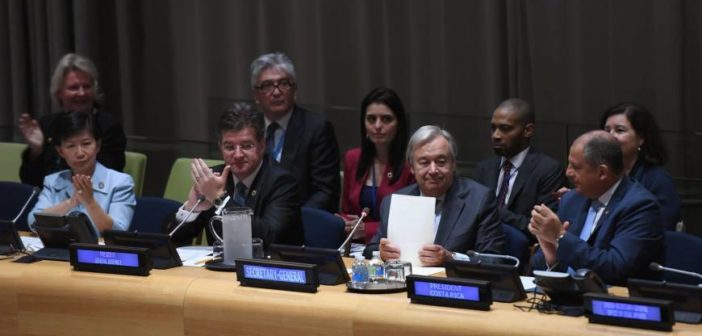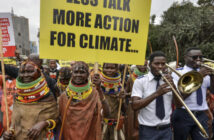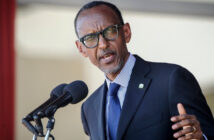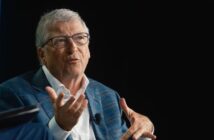Fifty countries on Wednesday signed a treaty to ban nuclear weapons, a pact that the world’s nuclear powers spurned but supporters hailed as a historic agreement nonetheless.
“You are the states that are showing moral leadership in a world that desperately needs such moral leadership today,” Beatrice Fihn, executive director of the International Campaign to Abolish Nuclear Weapons, said as a signing ceremony began.
Before the day was out, 50 states as different as Indonesia and Ireland had put their names to the treaty; others can sign later if they like. Guyana, Thailand and the Vatican also have already ratified the treaty, which needs 50 ratifications to take effect among the nations that back it.
They would be barred from developing, testing, producing, manufacturing, otherwise acquiring, possessing or stockpiling nuclear weapons “under any circumstances.”
Seven decades after the United States dropped two atomic bombs on Japan during World War II — the only use of nuclear weapons — there are believed to be about 15,000 of them in the world today. Amid rising tensions over North Korea’s nuclear and missile tests, U.N. Secretary-General Antonio Guterres said Tuesday that the threat of a nuclear attack is at its highest level since the end of the Cold War.
“This treaty is an important step towards the universally held goal of a world free of nuclear weapons,” he said Wednesday.
Supporters of the pact say it is time to push harder toward eliminating atomic weapons than nations have done through the nearly 50-year-old Nuclear Non-Proliferation Treaty.
Under its terms, non-nuclear nations agreed not to pursue nukes in exchange for a commitment by the five original nuclear powers — the U.S., Russia, Britain, France and China — to move toward nuclear disarmament and to guarantee other states’ access to peaceful nuclear technology for producing energy.
More than 120 countries approved the new nuclear weapons ban treaty in July over opposition from nuclear-armed countries and their allies, who boycotted negotiations.
The U.S., Britain and France said the prohibition wouldn’t work and would end up disarming their nations while emboldening “bad actors,” in U.S. Ambassador Nikki Haley’s words.
French Foreign Minister Jean-Yves Le Drian has called the treaty “wishful thinking” that is “close to irresponsible.” The nuclear powers have suggested instead strengthening the nonproliferation treaty, which they say has made a significant dent in atomic arsenals.
Absent from the signing ceremony were the five permanent U.N. Security Council seat holders — Britain, China, France, Russia and the United States — which all possess the destructive devices.
Nuclear umbrella nations, such as Japan and South Korea, and North Atlantic Treaty Organization members like Germany and The Netherlands did not endorse it either.
“Although we share the same feelings about nuclear abolition, (the treaty) differs from Japan’s approach, so we will not be signing it,” Foreign Minister Taro Kono told reporters in New York.
Brazil was the first country to sign onto the ban Wednesday, followed by nations from Algeria to Venezuela.
“Those who still hold nuclear arsenals, we call upon them to join this date with history,” Costa Rican President Luis Guillermo Solis said as he prepared to sign.
In attendance at the signing ceremony were Japanese atomic bomb survivors and the mayor of Nagasaki.
The adoption of the treaty on July 7, when 122 countries voted in favor of banning atomic weapons for the first time after decades of prodding by atomic bomb victims — known as hibakusha in Japanese — and civil society.
The treaty’s backers believe that their path is the best option to prevent future nuclear catastrophes of the kind experienced by Japan in 1945 during the closing days of World War II. The bombings of Hiroshima on Aug. 6 of that year and Nagasaki three days later ushered in the nuclear era.
“The heroic survivors of Hiroshima and Nagasaki — the hibakusha — continue to remind us of the devastating humanitarian consequences of nuclear weapons,” Guterres said.
Also speaking was Peter Maurer, president of the International Committee of the Red Cross, who said the organization received a cable from Hiroshima on Aug. 30, 1945 describing a “city wiped out,” a great number of dead and over 100,000 wounded.
“The world today needs the promise of this treaty: the hope for a future without nuclear weapons,” he said. “Humanity simply cannot live under the dark shadow of nuclear warfare, and the immense suffering which we all know would result.”




